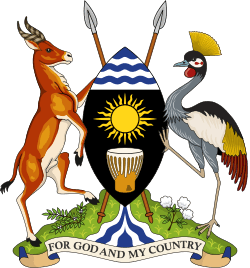Gomesi

A Gomesi, also called a Busuuti is a colorful floor-length dress. It is the most commonly used costume for women in Buganda and Busoga.[1] Traditional male attire is the kanzu.
Origins
There are many variations to the origins of the Gomesi. One such is that the Gomesi existed long before the missionaries and Indians came to Uganda, however, the missionaries introduced the use of cotton instead of the bark cloth, from which the Gomesi was originally made. When the Indians came to Uganda, they added the various fabrics from satin/silk blends and the vibrant colors to the traditional attire.
According to some scholars, the first Gomesi were made for schoolgirls in Gayaza, Uganda in the 1940s and 1950s. The Christian missionaries who ran the school hired a Catholic Goan tailor to design the dress. The tailor had the surname of Gomes hence the origin of the name. Traditional Ugandan clothing was made from barkcloth, though early photographic evidence from the nineteenth century demonstrates the arrival of cotton from the Sudan and from the East African Coast. The Gomesi was originally made from imported cotton fabric, with the aim of providing a loose garment that covered the breast. The Baganda were the first nationality to wear the Gomesi. Today the Gomesi is the Kiganda traditional dress for women and is also worn by other ethnicities in Uganda.
Design
The Gomesi is a floor-length, brightly colored cloth dress with a square neckline and short, puffed sleeves. The dress is tied with a sash placed below the waist over the hips. The Gomesi has two buttons on the left side of the neckline. Most Gomesi are made of silk, cotton, or linen fabric, with silk being the most expensive. A kikooyi or kanga is tied underneath the linen Gomesi to ensure that the fabric does not stick to the body. A well-made Gomesi can require up to six metres of cloth.
The Gomesi can be worn for any occasion, and in the rural areas it's the form of daily dress. Residents of cities and urban areas tend to wear it on special occasions such as funerals, and weddings. The Gomesi is worn at wedding ceremonies during the introduction, also known as the Kwanjula. During the Kwanjula, all female members of the groom's family are required to appear dressed in Gomesi.
Singer Alicia Keys wore the gomesi when she visited Uganda in 2007.[2]
See also
General:
